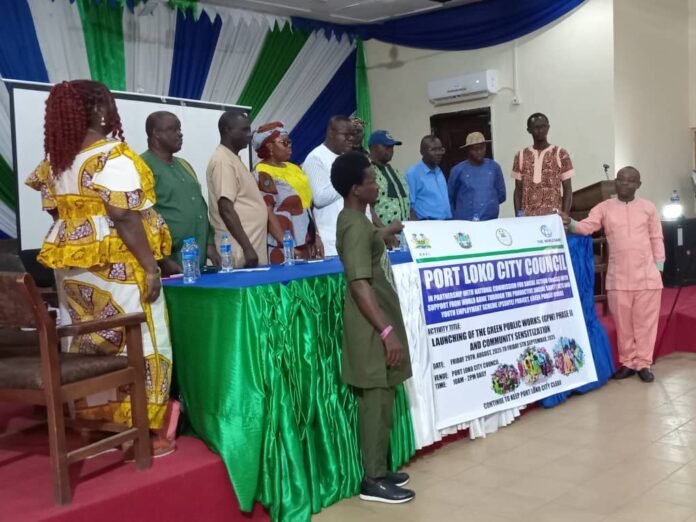By Emmanuel Precious Mohamed Koroma

The Port Loko City Council, in partnership with the National Commission for Social Action (NaCSA) and with support from the World Bank through the Productive Social Safety Nets and Youth Employment Scheme (PSSNYE), has officially launched Phase II of the Green Public Works (GPW) project alongside a community sensitization program at the Port Loko District Council Hall.
The event, held on Friday, was graced by local authorities, civil society, beneficiaries, and development partners.
In his welcome address, Saima Saide Koroma, representative of the Paramount Chief of Maforki Chiefdom, thanked participants for their attendance and commended the efforts of the youths engaged in city cleaning. He reaffirmed the chiefdom’s commitment to supporting development initiatives, noting, “Cleanliness is next to Godliness.”
Chief Administrator of Port Loko City Council, Mrs. Julia Amara Koroma, explained that the GPW was first piloted by Freetown City Council with youth participation in garbage collection and tree planting, funded by the World Bank. In May 2024, NaCSA expanded the project to six municipalities, including Makeni, Bo, Kenema, Koidu, Bonthe, and Port Loko.
Phase I in Port Loko engaged 500 beneficiaries over 120 days, from April to August 2025. Phase II, launched in July this year, targets 600 beneficiaries and focuses on three components: tree planting, garbage collection, and drainage clearing. The initiative aims to create short-term employment opportunities for women, youths, and persons with disabilities while promoting environmental sustainability.
NaCSA District Head Morie Sam praised the council’s decision to replicate the launch and community sensitization, noting that Port Loko stood out among participating cities. Civil Society Chairman Mohamed Kamara described Phase I as “highly successful” but stressed that sustainability would depend on tax compliance. He urged residents to support the council’s waste management drive.
Head of ACC Northwest, Madam Zinab Othman, outlined the Commission’s role in grievance redress and corruption prevention in the project. She encouraged beneficiaries to report malpractices via the toll-free lines 8515, 077985985, or 078986986.
Councillor Hassan Yeasana, Chair of the Solid Waste Committee, assured residents of his team’s commitment and urged beneficiaries to work diligently, while also appealing for cooperation from non-beneficiaries.
Africell’s Customer Care Supervisor in Port Loko, James Kanneh, addressed complaints of illegal deductions by mobile money agents and advised beneficiaries to use official Africell offices for transactions.
NaCSA Regional Coordinator, Rev. Farama J. Bangura, emphasized the Commission’s poverty reduction mandate and revealed that 70% of beneficiaries in Port Loko were women, making the city’s implementation outstanding nationwide.
Speaking on behalf of the Resident Minister Northwest, Ambassador Francis Patterson commended the council, NaCSA, and all partners for their efforts in keeping the city clean.
In his keynote, Mayor Alie Badara Tarawallie expressed gratitude to stakeholders and reaffirmed his vision for a transformed Port Loko. He highlighted his administration’s success in regaining the trust of the World Bank and NaCSA after the council was previously blacklisted.
“I came into politics with the determination to move Port Loko from its former state to an enviable stage. We have raised the bar high, and I am confident this council will deliver on Phase II effectively and transparently,” he said.
The mayor stressed that recruitment into the program was merit-based and not influenced by politics, with 50 extra slots reserved for unforeseen cases. He also appealed to the media to report fairly and urged community members to support the council’s development agenda.
The event concluded with statements from Professor Alhaji Brima Grogra, Deputy Vice Chancellor of Ernest Bai Koroma University, and other stakeholders, who reaffirmed their commitment to ensuring the success of the GPW Phase II
The Prevention First Initiative recently commenced their educational training sessions for bike riders on the topic: Empowering Youth Bike Riders as Sustainable Agents of Peace.




